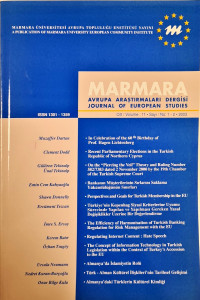Abstract
Culture is a process and action of formation engendered by the contribution ofthe synthesis ofaccomplishments and accumulations called "self' and "other". In this approach, culture is an expression of "local" and "universal" coming together and gaining a new content and form. The Turkish community in Germany is developing its identity in a "multi- factored, multi-layered and multi-directional" environment. Multi- culturality and alienship, in/exclusion and integration efforts for humanitarian reasons accompany the development process of cultural identity.
Individual and societal identity get evident under the effect of the said factors that together condition the life. Besides exclusion, the tendencies of integration and ofmaintaining the difference are among the typical qualities of cultural identity. Thus, establishment o f a social environment that promotes the formation of a harmonious conscious on the basis offairness and participation, as well as pursuing a lifestyle by the both sides required by such a conscious are consequential.
The humanitarian development of the cultural identity in multi-cultural life environments is mainly possible with members' avoidance from exalting "national origin, religion or sect" that they take as "self'. In this context, staying away from ethno-centric understandings and attitudes is one of the assurances ofa peaceful and humanitarian coexistence. To promote such a humanitarian coexistence, some legislative regulations should be materialized and implemented by the German government like making dual citizenship possible or prevention ofdiscrimination. Turks shouldfollow the same route.
The Turkish community which has gained even more permanency in Germany is experiencing a social and educational differentiation within itself. This situation has its direct repercussions on the cultural identity. Besides this, contribution to scientific and artistic activities is on increase, and philosophical dimension is becoming more manifest. Under the light of the developments in question, Turks are becoming not a "cultural minority" but an inseparable component of the German society. Germans and Turks should develop a "common life design" taking the requirements of these realities and ofdemocratic social order into consideration, and activate it in cultural, political and social life.
References
- -
Details
| Primary Language | Turkish |
|---|---|
| Journal Section | Makaleler |
| Authors | |
| Publication Date | December 28, 2003 |
| Published in Issue | Year 2003 Volume: 11 Issue: 1&2 |


